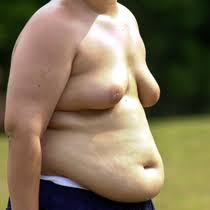It explains, among other things, why:
Michellesie "The First Cow" Obama is a friggin' ignoramus and her hubby has s**t for brains (apparently a matched pair) on this matter (at least)
why "junk food taxes" simply will not work and
why we should not allow ourselves to be tyrannized by the fat and cave in to their caloric irresponsibility by agreeing to pay more for our food which we consume responsibly.
Recently, the Obama administration called for a total ban on candy and soda in the nation’s schools. States are beginning to impose “sin taxes” on fat and sugar to dissuade people from eating junk food. Pricing strategies may well be a key to changing behavior, but others favor subsidies over punitive taxes, as a way to encourage people to eat fruits and vegetables and whole grains. The thought is that if you make it cheaper, people will eat more of it, more expensive and people will eat less.These findings are consistent with the results of another study where people paid to behave "good," in a health-wise sort of way, took the money and bought Calories.
Decades of behavioral economics research argues that consumers are not always so rational and the two strategies have never been tested head to head, to see which one most effectively alters calorie consumption. So, psychological scientist Leonard Epstein at University of Buffalo, decided to explore the persuasiveness of sin taxes and subsides in the laboratory.
Epstein and colleagues simulated a grocery store, “stocked” with images of everything from bananas and whole wheat bread to Dr. Pepper and nachos. A group of volunteers — all mothers — were given laboratory “money” to shop for a week’s groceries for the family. Each food item was priced the same as groceries at a real grocery nearby, and each food came with basic nutritional information.
The mother-volunteers went shopping several times in the simulated grocery. First they shopped with the regular prices, but afterward the researchers imposed either taxes or subsidies on the foods. That is, they either raised the prices of unhealthy foods by 12.5%, and then by 25%; or they discounted the price of healthy foods comparably. Then they watched what the mothers purchased.
To define healthy and unhealthy foods, the scientists used a calorie-for-nutrition value, or CFN, which is the number of calories one must eat to get the same nutritional payoff. For example, nonfat cottage cheese has a very low CFN, because it is high on nutrition but not on calories; chocolate chip cookies have a much higher CFN. The researchers also measured the energy density- essentially calories- in every food.
The results, just published in Psychological Science, a journal of the Association for Psychological Science, show that taxes were more effective in reducing calories purchased over subsides. Specifically, taxing unhealthy foods reduced overall calories purchased, while cutting the proportion of fat and carbohydrates and upping the proportion of protein in a typical week’s groceries. By contrast, subsidizing the prices of healthy food actually increased overall calories purchased without changing the nutritional value at all. It appears that mothers took the money they saved on subsidized fruits and vegetables and treated the family to less healthy alternatives, such as chips and soda pop. Taxes had basically the opposite effect, shifting spending from less healthy to healthier choices. On the basis of this laboratory research, the scientists conclude that subsidizing broccoli and yogurt- as appealing as that idea might be to some- may be unlikely to bring about the massive weight loss the nation now requires. (hyperlink added)
pay more for having kids if they cannot be dissuaded from reproducing,receive less income at work since they cost businesses more and are less productive.

.jpg)


















